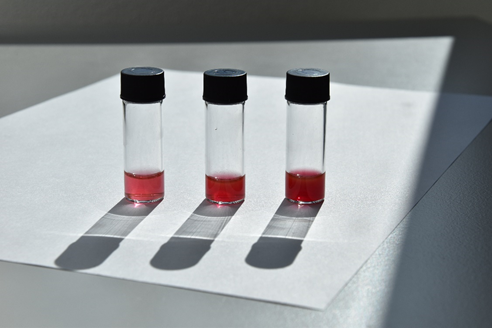Filippo Pierini from the Department of Biosystems and Soft Matter, IPPT PAN, has received funding for a scientific project, carried out with a foreign partner from Italy, as part of the CANALETTO programme. CANALETTO comprises of research projects shared between specific Polish and Italian research groups. (read more about the NAWA programme here)

Filippo Pierini’s project is entitled: Nanostructured light-responsive hydrogels based on polythiophene derivatives for photothermal therapy (Światłoczułe hydrożele nanostrukturalne na bazie pochodnych politiofenu i ich zastosowanie w terapiach fototermicznych).
The main objective of the research proposal is to develop polymer hydrogel based materials with unique chemical, mechanical and optical characteristics. The combination of conjugated polymer and soft hydrogel materials is a very hot topic because of the possibility to realize nanostructured devices with a broad range of possible applications from optics to medicine. The produced nanostructured material will be used to develop stimuli-responsive photo-absorbing agents are able to efficiently convert the absorbed light into heat. Realization of this biocompatible light-responsive polymers platform has huge potential for biomedical medical applications, because the generated heat can induce a local hyperthermia that results in irreversible damage for cancer cells: photothermal therapy (PTT). Conducting polymers have recently attracted great interest due to their biomedical applications. Polythiophene (PT) derivatives are very attractive materials particularly suitable to be used as biomaterials because they have several of the required properties such as excellent photostability, light-harvesting ability, easy synthesis, facile functionalization with different substituents, ability to release drugs, biocompatibility and they can also be customized with a variety of functional groups. One of the first objectives for the project realization is the design and optimization of the synthesis of thiophenic-based polymers and copolymers with the heterocyclic units functionalized by alkyl chains bearing polar groups capable of conferring to PT a good solubility in aqueous systems. Moreover, the good solubility in water is a fundamental requirement for the subsequent synthesis of the Polythiophenic Interpenetrated Polymeric Network (IPN) hydrogels. Water-soluble NIR-absorbing polythiophenes will then be linked to the PNIPAAm hydrogel in order to obtain the target photothermal theranostic material.

Image: hydrogels containing different amount of polythiophene derivatives


















